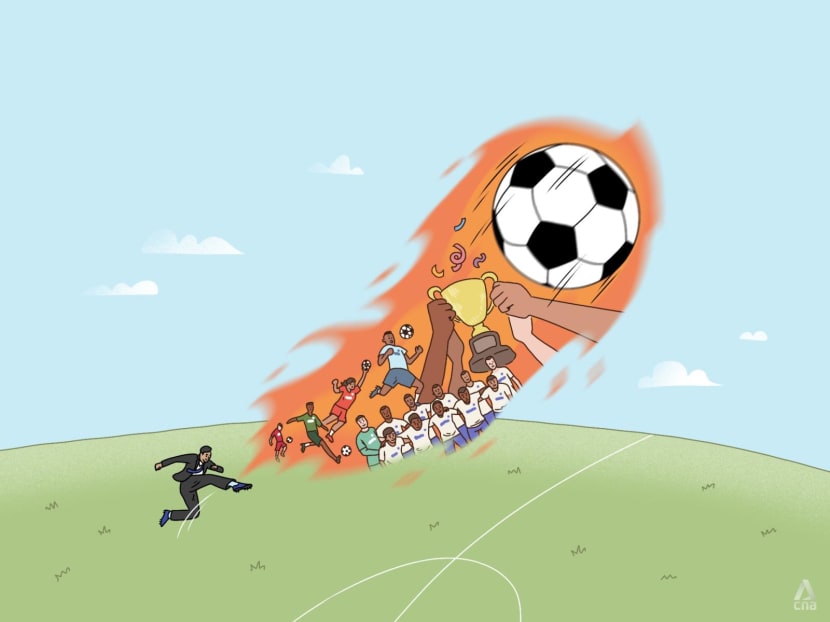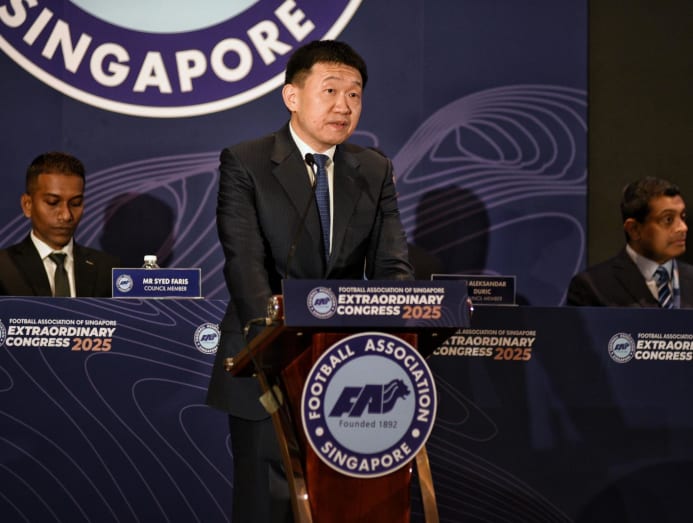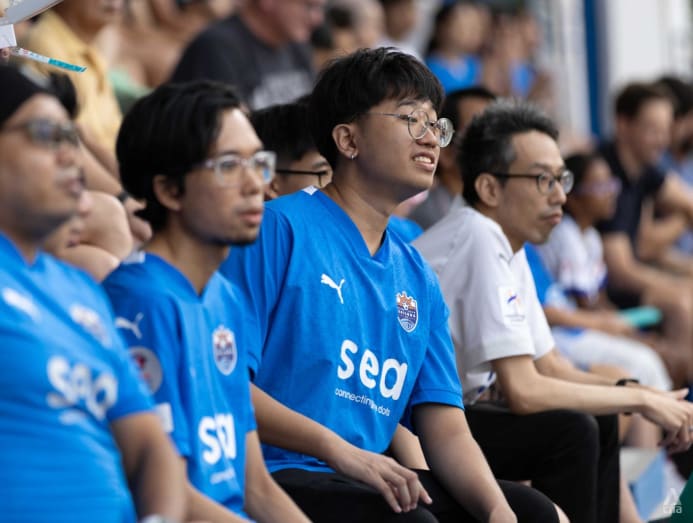Billionaire FAS president Forrest Li has the financial means and the zeal, but are these enough to revive Singapore football?
The chief executive officer of technology conglomerate Sea has already brought the Lion City Sailors Football Club continental repute. Observers are cautiously hopeful he will do the same for the national team.

With billionaire Forrest Li’s appointment as president of the Football Association of Singapore, the question is not just what new ideas he might bring, but whether he can follow through where others could not. (Illustration: CNA/Nurjannah Suhaimi)

This audio is generated by an AI tool.
Optimism is not a word usually associated with football in Singapore. Yet, there is a flicker of excitement these days in footballing circles here.
Billionaire entrepreneur Forrest Li was elected president of the Football Association of Singapore (FAS) in April, leading a new council comprising notable names such as national team captain Hariss Harun and former stalwarts Aide Iskandar and Aleksandar Duric.
For a sport long mired in public apathy and poor performances, Mr Li’s appointment feels like a much-needed injection of star power and ambition.
Mr Li, 47, a Singapore citizen who was born in China, is best known as the founder of the Sea Group – the technology giant behind retail platform Shopee and gaming platform Garena. Media company Forbes estimated Mr Li's wealth at about US$9.9 billion.
In 2020, Sea acquired one of Singapore's most successful football clubs, Home United, and rebranded the team as the Lion City Sailors.
The team has gone on to achieve myriad successes on the pitch in the five years with the company’s financial backing.
Most recently, the Sailors pulled off the domestic league and cup double in the 2024-2025 season and made history by becoming the first team from Singapore to reach the final of the Asian Football Confederation (AFC) Champions League Two – where they ultimately fell 2-1 to Emirati side Sharjah FC.
The club’s success on the pitch is also underpinned by the good work off it. The Sailors boast a reputable academy and, in 2022, built a state-of-the-art training facility along Mattar Road in the Aljunied area.
So when Mr Li’s name emerged as the man set to lead the national football body, some fans – for so long jaded by overly ambitious goals crumbling into a lack of visible progress – allowed themselves to be hopeful.
Sailors supporter Tan Chin Heng, 35, an engineer by profession, said that despite “chronic issues” that have plagued the Singapore football scene in recent years, he is cautiously optimistic about Mr Li’s term.
“If his time at Sailors has been anything to go by, he is someone capable of bringing about positive and transformational changes,” Mr Tan added.
Mr Robin Wong, president of Jungfrau Punggol FC, a team competing in the first division of the Singapore Football League (SFL), was even more confident of the tech billionaire’s prospects of success.
“Without a doubt, Mr Li and his team will bring Singapore football to another level. He has the network and the financial ability to do so,” he said.

Indeed, Mr Li’s chairmanship of the Sailors was neither his first involvement nor financial investment in Singapore’s top-flight football scene.
In 2016, Garena inked a two-year deal with the Young Lions worth about S$4 million (US$3.1 million), providing the club with S$2 million in cash and another S$2 million allocated for the promotion and development of the team.
The Young Lions is a developmental football club comprising young Singaporean footballers serving their compulsory two-year National Service. It was the biggest sponsorship deal for a team here since the league was founded in 1996.
At the time, Mr Li stated that he felt the investment into the Young Lions would be "for the long term” and that the two-year sponsorship was “just the starting point”.
“After two years, if we see all these players turn professional, grow as players and as people, and we feel that the dollar we put in is good money, we would love to continue,” he said.
While Garena's sponsorship with the Young Lions was not extended, it appears that Mr Li's belief in investing in the nation’s youth has not wavered.
In his maiden speech as FAS president, he said he would focus on “building up the fundamentals of a healthy football ecosystem”, which includes youth development.
Other areas he specified were Singapore football’s infrastructure, partnerships, league competitiveness and administrative effectiveness, though he stopped short of providing more details.
Is the tech billionaire’s financial prowess enough to resolve long-standing issues holding back Singapore football? CNA TODAY takes a look.

OLD PROBLEMS
While Mr Li’s appointment has breathed some renewed optimism into the footballing scene here, the challenges he has inherited are neither new nor easily fixed.
CNA TODAY asked more than a dozen fans and observers to identify the most pressing issue facing Singapore football that Mr Li should prioritise solving.
Their answers were varied, mentioning everything from shortcomings in infrastructure and the youth set-up, to inconsistent national team performances and an underwhelming domestic league.
Most visibly, from a public perspective, the men’s national team has struggled for consistency across the board.
While there have been moments of promise, such as a 2-2 comeback draw against China in the team's FIFA World Cup qualifying campaign in March last year, fans have suffered their fair share of lows – including a 7-0 drubbing at the hands of Malaysia at the 2023 Southeast Asian (SEA) Games.
“The results for the past three years haven’t been satisfactory,” national serviceman Terence Yip said. The 21-year-old is an avid supporter of Geylang International FC.
“Of course, I want to see the national team achieve silverware, but to be more realistic, we need to first win games against teams like Indonesia, Malaysia and Thailand.
“We used to be a powerhouse team, but now the national team has no direction.”
That heavy defeat against Malaysia prompted FAS to release 10 recommendations to improve the nation’s performance at the biennial competition.
The review committee responsible for the report found that players from the SEA Games squad consistently gave feedback that they were “not prepared for the high tempo” at the Games – a finding that raised many questions in the football fraternity.
Off the pitch, reform efforts have struggled to take root.
One of the cornerstone initiatives launched under the previous FAS council was a campaign dubbed Unleash the Roar (UTR), unveiled alongside SportSG in 2021, aimed at revitalising the football ecosystem and producing a national team that could qualify for the 2034 FIFA World Cup.
A key pillar of that plan was to privatise the Singapore Premier League (SPL), injecting a competitive edge into a league that has long suffered from low attendance and limited visibility – but this has yet to take off, too.
Progress on this front has instead been spearheaded by clubs such as BG Tampines Rovers and Geylang International, which have managed to attract private partnerships of their own accord with Thai-based Bangkok Glass (BG) and City Football Group respectively.
However, insiders said that such interest can be hard to sustain, because there is hardly any return on investment from putting money into the SPL. This was the view of Mr R Vengadasalam, who used to be general manager of the past Woodlands Wellington FC.
Compounding matters are the poor state of infrastructure across Singapore’s football stadiums and the scarcity of pitches.
Mr Wong of Jungfrau Punggol said semi-professional clubs such as his struggle to find pitches for training and that he spends thousands of dollars each month simply to rent them for a few hours each week – an expense most other semi-pro teams cannot afford.
The quality of the stadiums where his team plays for the SFL are hardly up to par either.
Mr Wong said: “We need to start with the basics. We’re not asking for brand new stadiums but at the very least, refurbish the dressing rooms to be of a decent standard. Some are really run-down and look like they haven’t been washed in years.”
This does not inspire confidence in aspiring players looking to make their way into the professional game, he added.
Now, with Mr Li at the helm, the question is not just what new ideas he might bring, but whether he can follow through where others could not.
STEERING THE SAILORS
Much of the hope that Mr Li and his team can usher in much-needed change stems from the track record of his transformational tenure as chairman of Lion City Sailors.
Soon after his takeover in 2020, the Sailors won the SPL in 2021 – immediate results brought by an injection of funds and an overhaul of players and staff members.
Singapore talent was supplemented with foreign players, with headline-grabbing examples such as Brazilian attacking midfielder Diego Lopes, who was signed for S$2.9 million in 2021, and Dutch midfielder Bart Ramselaar, who cost the club S$2.2 million last year.
Mr Li has also poured money into strengthening the club’s infrastructure.
In June 2020, Lion City Sailors launched their football academy and in June 2024, the academy was awarded a two-star rating by the Asian Football Confederation (AFC) after being assessed across 20 categories.
These included metrics such as access to specialist goalkeeper coaching, the provision of rehabilitation protocols and the availability of international exchange opportunities. It is the only academy in Singapore that has been awarded a rating under the AFC Elite Youth Scheme.
.jpg?itok=q35T27LW)
In July 2022, the Sailors opened the doors to their integrated training centre, which was reported by sports channel ESPN as having cost in excess of S$10 million. It features five pitches, a gym, physiotherapy rooms and even study rooms for academy players.
The club has professionalised its off-pitch operations as well.
These include the club’s data analytics capabilities and its partnership with Kitman Labs, a sports analytics company that has provided a football intelligence platform to English Premier League academies.
This partnership is aimed at contributing to scouting, monitoring player progress and even developing training plans.
It is this prior track record of not only financial commitment, but also setting up the infrastructure for success on and off the pitch, that sparks hope among a sizeable number of the fans CNA TODAY interviewed.
Mr Tan the Sailors supporter said: “With Sailors, he has so far demonstrated the ability and commitment to drive change, as well as getting the right people into the right positions to get things done.
“I am cautiously optimistic about his term as FAS president.”
NEW FACE, FRESH INPUT
When asked what Mr Li can bring to the table that previous FAS presidents could not, the most common response CNA TODAY received from fans and commentators alike was "money".
Some fans hoped that Mr Li would put his own money into the FAS, citing the example of former Football Association of Malaysia president Tunku Ismail Sultan Ibrahim, who reportedly used personal funds to aid in the search for a new head coach in 2017.
Fans and commentators expressed hope that Mr Li’s networks and reputation can unlock new sponsorship streams.
Mr Jose Raymond, founder of The Monitor Singapore, an independent football news and commentary site, said: “Forrest has a lot of connections to tech startup owners, who have resources to burn or support.”
He pointed out that Mr Li’s networks would be different from those of previous FAS presidents, which have included politicians, academics and lawyers.
That said, sponsorships are not new to FAS. Previous administrations secured backing from brands such as AirAsia, Great Eastern and Epson.
Yet, overall sponsorship revenue has dwindled, from S$3.91 million for the financial year ending March 2014 to S$1.05 million for the financial year ending March 2024.
If Mr Li were to pump in his own funds into the FAS, that could provide an initial boost, although it would not be a sustainable strategy in itself, said football observer Edwin Yeo.
"If the initial boost is used to build up the capacity of the ecosystem, help more clubs on a pathway to becoming professional, to better connect with communities and increase the fan base, that would make Singapore football more appealing to sustainable sources of income such as sponsors, sports rights and ticket, player and merchandising sales."
The lack of sponsor retention reveals a more fundamental challenge of turning Singaporean football into an attractive commercial proposition – one which Mr Li, with his business experience, might be uniquely positioned to address.
“Forrest, with the entrepreneurial knowledge he brings to FAS, should be able to open up more opportunities for football to develop as an industry,” Mr Raymond said, noting that football remains the most marketable sport globally.
“But he has to wreck the building structures and rebuild from the bottom up. Otherwise, this organisation won’t be able to move.”
Mr Raymond also highlighted Mr Li’s experience as a “turnaround artist”: After losing 80 per cent of his US$22 billion net worth in 2022, Mr Li steered his companies towards profitability within two years.
“If he brings that (crisis confronting) mentality to the FAS, this organisation will become a lot better,” Mr Raymond added.
However, Mr Li will not be running FAS alone as president, observers noted, and the success of FAS depends equally as much on the capability of its council.
“Think of the FAS president like the chairman of a board. If you hire the right people, the FAS president doesn’t need to get that involved,” Mr Yeo said.
Mr Li's council includes a mix of familiar faces from different parts of the football ecosystem.
In addition to former national team players, the slate includes deputy president Desmond Ong, former chairman of BG Tampines Rovers, and vice-president Sean Bai, who is now chief of staff at English Premier League side Burnley FC.
Mr Tan the Sailors supporter said his initial reaction to the new council was that it looked like “a diverse yet competent lineup”.
Still, some concerns were raised about potential conflicts of interest, given that Mr Li remains chairman of the Sailors and that many on the new council are still affiliated with the club.
These include vice-president Hariss Harun, who is a Sailors player, vice-president Tan Li Yu, who is its general manager, and council members Bruce Liang and Yeong Sheau Shyan, who are the club’s executive director and head of the Sailors’ Women's team respectively.
Logistics executive Amir Hamizan, 27, who is a fan of SPL side Albirex Niigata Singapore, said: “I wouldn't know what he might change to maybe benefit his club.”
Mr Raymond, the football commentator, said that this needs to be managed well in the eyes of the public in order to “ensure confidence in the system”.
QUICK WINS?
The current FAS council will serve a term of four years until 2029. Apart from unveiling sponsors and partners, fans and commentators noted some areas that Mr Li and his team could be well-placed to tackle in the short term.
Former Balestier Khalsa coach Peter de Roo said: “There’s a need to set high standards from the top – in this case, that’s the FAS.”
Mr de Roo, who last month led Balestier Khalsa to consecutive top-four finishes for the first time since 1998, drew from his own experience with the team and said that it was possible to change the culture within an organisation to a more positive one, even with limited resources.
“The players saw the club was at least trying to get better and making an effort. If you want players to get better every single day, it’s not enough for the coach to say that. But they will hear the message if the effort from the organisation is there.”
Part of inspiring that confidence in the organisation and ecosystem again is having some form of success on the pitch, Mr Raymond said.
He recalled how Singapore’s 2004 Tiger Cup win under coach Radojko “Raddy” Avramovic revitalised interest in football and people began to take an interest in national team matches and supporting the clubs.
“A small win can be the spark that’s needed to be a confidence-building measure,” he said.
.jpg?itok=fVna0KRN)
Fans and commentators also pointed to organisational development as another area that Mr Li and his team can address in the near term.
Mr Yeo the football observer said: “FAS has been critically short on technical staff, and marketing and communications staff. Both are essential if the association is to run well and engage fans better.”
Indeed, engagement and communication with its supporters is an area where fans believe more can be done.
An example of this is the organisation's online presence.
Mr Chuan Rei Hern, a 19-year-old student and avid follower of Singapore football, noted that “basic statistics” such as information on the SPL’s top goal scorers cannot be found on FAS' websites.
He believes such issues that can be quickly solved and improved upon should be the new council’s first order of business.
“How do new fans even get into the Singapore football circle when baseline information is so disjointed and difficult to reach?” he asked.
Although it is undoubtedly more complicated than updating a website, focusing on improving the standard of coaching is another aspect that could feasibly be done during Mr Li’s tenure.
Mr de Roo, who previously held roles as technical director in Australia’s FFA Centre of Excellence and the Football Association of Malaysia, identified Mr Gavin Lee – assistant coach of the Singapore men's national team and former BG Tampines Rovers head coach – as one of the most promising coaches in the nation today.
However, he noted that this prominence is a product of an individual effort to go “above and beyond” to improve himself, as opposed to being a product of the coaching education here.
“If you want to develop better players for your senior national team, the players have to work with better coaches and that means you have to develop better coaches.”
WHAT MIGHT BE OUT OF REACH?
However well-resourced or well-connected Mr Li might be, there are other fundamental challenges that he and his council may struggle to solve.
At the heart of these challenges is that not everything in football is controlled or dictated by the football association alone, observers said.
One common problem raised was the lack of unity across the ecosystem. While clubs, schools and private academies all contribute to the sport, they often operate in silos with little alignment in objectives or standards.
Mr Vengadasalam, who now runs the Woodlands Lions FC, said that he often has players who are unable to train with his club's academy, for instance, due to clashes with the schedules of their schools’ co-curricular activities.
Mr Vengadasalam believes such a disconnect between the school system and academies like his means that player development is often halted.
It is this fragmentation in the fraternity that might be a hurdle too large to overcome, Mr Raymond said.
“The schools’ football system is an entire ecosystem on its own,” he added.
“It’s a challenge to bring them all together and to agree on a technical strategy or a certain point of action.”
Mr Yeo the football observer believes that one of the most intractable challenges Mr Li and the new FAS council faces is infrastructure, or the lack of control over it.
“No club apart from the Sailors owns any facility whatsoever. Even if they’re a top team and they play in the SPL, they don’t own a stadium,” he noted.
This is not unique to Singapore.
Professional clubs in Japan, for instance, do not own their stadiums either. However, Mr Yeo pointed out that Japanese local governments work closely with clubs to ensure facilities are prioritised for football use.
“Priority does not mean that other sports cannot use those facilities,” he said, but there must be a “football lens” when infrastructure is built or refurbished.
He gave the example of Singapore's National Stadium, which has a “lay-and-play” natural grass pitch system that involves laying specially grown turf for major events. This allows for quick pitch replacement and ensures a high-quality playing surface.
“But land scarcity is the biggest problem. Even if we have a bottomless pit of money, you can't just build stadiums for every single club or even training pitches. There are so many parties with conflicting agendas when it comes to land in Singapore," he added.
“So you have a difficult situation that I don’t think even (Mr Li) can resolve. He has to try to convince the government as to why it's important to build these facilities that can improve football professionalism."
He continued: “This would be the biggest challenge, even bigger than developing talent.”
Still, those in the fraternity remain hopeful that change is possible, as long as it is done collaboratively and with conviction.
Mr de Roo said: “It starts with recognising where (things) go wrong, how to fix it and then appointing quality people to do that.
“Then make sure that they have the authority to do so, because there’s no point appointing quality people if they are still hamstrung. Back them up, facilitate them and be strong.
“With infrastructure, you have the involvement of the ministries and other stakeholders. Sit at the table – you all want the same outcome, discuss how you are going to do that.
“Everybody tries to tell me that Singaporeans don’t care about football. That’s not true. They love football, but they’ve just lost faith.”














